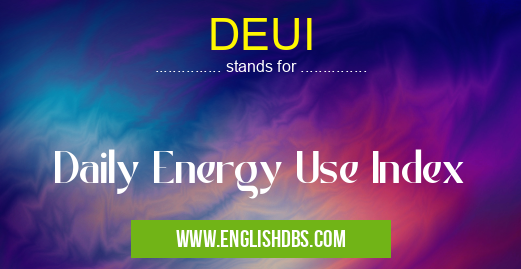What does DEUI mean in ENERGY
Daily Energy Use Index (DEUI) is a metric used to measure the energy consumption of buildings on a daily basis. It is calculated by dividing the total energy consumed by the building in a day by the total floor area of the building. The result is expressed in units of energy per square foot per day. DEUI is a useful tool for comparing the energy efficiency of different buildings, and for tracking the energy consumption of a single building over time.

DEUI meaning in Energy in Governmental
DEUI mostly used in an acronym Energy in Category Governmental that means Daily Energy Use Index
Shorthand: DEUI,
Full Form: Daily Energy Use Index
For more information of "Daily Energy Use Index", see the section below.
» Governmental » Energy
DEUI Meaning in GOVERNMENTAL
DEUI is a particularly important metric for government buildings, as they are often large consumers of energy. By tracking the DEUI of government buildings, governments can identify opportunities to reduce energy consumption and save money. In addition, DEUI can be used to benchmark the energy performance of government buildings against other similar buildings, and to set energy efficiency goals.
DEUI Full Form
The full form of DEUI is Daily Energy Use Index.
What Does DEUI Stand For?
DEUI stands for Daily Energy Use Index.
Essential Questions and Answers on Daily Energy Use Index in "GOVERNMENTAL»ENERGY"
What is Daily Energy Use Index (DEUI)?
The Daily Energy Use Index (DEUI) measures a building's energy consumption per square foot per day. It's a key metric used by energy auditors and building managers to compare energy performance and identify areas for improvement.
How is DEUI calculated?
DEUI is calculated by dividing the total energy consumption of a building by the total square footage of the building and the number of days in a year. The result is expressed in units of energy per square foot per day.
What is a good DEUI?
A good DEUI varies depending on the building type, climate, and other factors. However, a DEUI below the national median for similar buildings is generally considered good. Energy Star-certified buildings typically have DEUIs in the top 25%.
How can I reduce my building's DEUI?
There are several ways to reduce a building's DEUI, such as:
- Improving insulation
- Upgrading to energy-efficient appliances and lighting
- Installing solar panels or other renewable energy sources
- Optimizing HVAC and lighting systems
- Implementing energy management practices
What are the benefits of tracking DEUI?
Tracking DEUI can provide several benefits, including:
- Identifying areas for energy savings
- Verifying the effectiveness of energy efficiency measures
- Setting energy reduction goals
- Benchmarking building performance against others
How often should I track DEUI?
DEUI should be tracked regularly, typically monthly or annually. This allows you to monitor energy consumption trends and make adjustments as needed.
Final Words: DEUI is a valuable metric for measuring the energy consumption of buildings. It is a useful tool for comparing the energy efficiency of different buildings, and for tracking the energy consumption of a single building over time. DEUI is particularly important for government buildings, as they are often large consumers of energy. By tracking the DEUI of government buildings, governments can identify opportunities to reduce energy consumption and save money.
